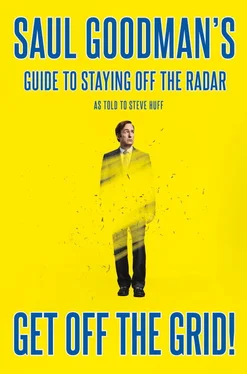Better Call the Gym.Totally joking about the gym, my friend. If anything, my advice is to avoid having something like a gym membership in your new life. Avoid it like the plague. That’s just another set of papers filled out in your handwriting and another set of surveillance cameras catching your sweaty face as you flop around on the treadmill. The serious part is this, though: it’s a good idea to keep fit in the comfort of your own home. You’ve got to remain agile, mobile, ready to move whenever possible. So do a set of push-ups and some squats each morning, maybe some sit-ups every night, too—and you’ll probably be good to go.
If nothing else, walking will do you a lot of good. No license or even ID is required, it gets you where you’re going, and you stay in shape. When the grim reaper might be around the corner in the form of a newly un-incarcerated enforcer with the nickname Kiddie Hitler, all that truly matters is you remain nimble enough to stay a few steps ahead.
* * *
Next up is a pretty important stopgap measure. The move that might keep a solid firewall between you and whomever is still a little too curious about your whereabouts after you’ve slipped off the radar. Let’s talk mail drops, redirects, and other spycraft.
No Permanent, Fixed Address
Put down your bindle, this isn’t more harping on the transitory glory of the hobo life.
Even though I’ve probably mentioned mail at least once already, we haven’t really explored the world of obscuring yourself from the United States Postal Service and various other private but similar entities, like UPS and FedEx. This is an integral part of our plan to wipe you off the grid. Why? Because advertisers possess the ability to leverage details about your online purchases, real-world buying habits, and what Web site links you just happen to click on in order to track you down and keep marketing directly to you—and they’re not the only ones with programmers hacking away night and day at formulas aiming to profile each and every one of us.
I don’t mean that you shouldn’t use the mail. If you are settling into a new life and living in an apartment, a house, even a well-built yurt, then chances are you will need to send and receive actual mail. In spite of the rallying cry to “go green” and folks predicting on an annual basis that traditional mail is dying: it ain’t.
What about a good ol’ post office box? A separation of church and physical address? Just as with the United States–Canada border crossings, a certain terrible date in recent American history made the easily rented post office box a thing of the past. Thanks to the Patriot Act, every U.S. Post Office box requires IDs, signatures, and the promise of some pretty ugly penalties for anyone who provides false information on the application forms. But what’s more American than taking a few liberties? But if you’re nervous about giving the Inspector General the slip, here are some alternate methods of communication…
The Anonymous Drop.Sounds like the name of a band that specializes in songs about computer hacking and Star Trek fan orgies, but no. An anonymous mail drop is a real thing and we’ve already mentioned one in passing, back when I told you about the mysterious Lori Ruff.
It might sound like it works in a pretty straightforward way. Anonymous mail drops receive mail intended for you at an address separate from your actual residence. The mail either stays at that place until you make a pickup or a third party sends it to wherever you actually are.
You can find one of these services pretty quickly online and set up an account—but there’s a catch. Frequently, if you want mail that’s coming from the U.S. Postal Service, a re-mailing service will need you to fill out one of the USPS’s special forms that requires identification and notarizing (exactly the kind of trace you’re looking to keep off the paper).
If your fake ID is solid and there’s a way to finagle a notarization from a source you trust to turn a blind eye, great! But if you’ve come this far, I’ve taught you nothing if that doesn’t set off a few red flags.
Okay, if the mail or parcels you expect are coming from a private service (UPS, DHL, whatever you use to TCB), you’ll still be good with one of these standard-issue re-mailing services. But what about that U.S. mail hiccup?
Early in my storied career as one of the finest legal minds to ever grace a New Mexico courtroom, I had a modest office in the rear of another establishment. It was inexpensive and versatile, and the arrangement worked like gangbusters for everyone involved.
Across the country, in cities big and small, there are millions of strip malls, small office parks, and office buildings teeming with empty spaces identical to that office of mine in need of key-turning proprietors. Outside of expensive cities like San Francisco and New York, these places tend to run relatively cheap.
When you start casting around to set up your mail drop, do a little surveillance.
Let’s assume you’re going to settle down and make like a normal human, just with a new name and history, and you’re doing it in a decent suburban or even urban area. Start looking for office buildings or parks that look a little long in the tooth. The landscaping has gone shaggy or the plaster has started to fall away. You find a workspace that could use a new coat of paint to cover a multitude of brown patches currently staining the ceiling? Welcome to your dream castle.
Next: find the rental office for that place. Tell the owner your business works out of home, but you really need a separate space to catch all your parcels. Not just regular mail, but FedEx and the like. Depending on how keen that owner or landlord is to have someone paying something more than zero dollars to keep the space occupied, you may be able to secure a mail drop to your new name for a firm handshake and $100 per month.
There are several variations of this kind of drop. Worldly traveler you are, you could befriend the owners of a small independently operated bed-and-breakfast. With the promise of your patronage each time you’re traversing the near portion of the Appalachian Trail (or whatever granola-chewing endurance artists try to conquer in your area), you might be able to arrange to have mail sent to your new name at their address.
If you’ve been smooth enough over time with establishing your new life, then you could even get away with having mail sent to your new name at whatever address you currently reside.
However: remember the Spooky Magic of the Internet Algorithm? I’m talking about the way shopping and search habits can lead to a retailer knowing more about you than your boy- or girlfriend might.
If, under your new name and in your new life, you still like to shop at Big Box Mart and at some point you’ve relaxed enough into the new groove that you’ve given them your mailing address while purchasing a video game, who’s to say it won’t be used against you? More than one teen girl has found herself idly searching for baby items on one store’s Web site and blam! a few weeks later, coupons for pregnancy-related items arrive at the home she shares with her folks—who definitely did not know she was pregnant. What better way to break the news than with a two-for-one deal on sun-proof baby bonnets?
I’m just trying to give you some idea of what you’re facing in a world where technology tightens its stranglehold on our mortal existence every day.
Which, hey, if strangling is your thing, who am I to judge? If life hasn’t thrown challenges, obstacles, hit men carrying hammers into your path, then all that interconnectivity is not going to feel like such a big deal. But if you’re among the unlucky who have discovered a real need to relocate, then some retail giant’s computer algorithms profiling you via your love of movies starring Ray Milland may one day prove troublesome.
Читать дальше












